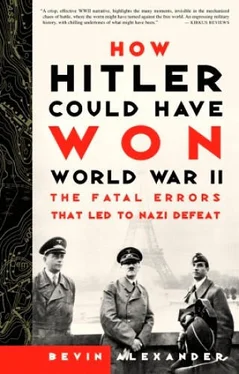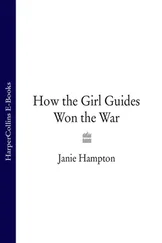Göring concentrated his fighters and bombers for an all-out assault on airfields and fighters in southern England. He and other Luftwaffe leaders didn’t realize that the RAF’s greatest strength was not its fighter aircraft, vital as they were, but the new British-developed radar, which sent out radio signals that struck incoming aircraft and reflected them back to receiving stations. By 1940 Britain had a double line of radar stations facing the Continent. One line consisted of receivers on high towers that could detect high-flying enemy aircraft 120 miles away. The other had a shorter range but could pick up low-flying aircraft.
The radar net, combined with Observer Corps spotters on the ground who tracked aircraft once past the coast, gave the RAF advance warning of approaching bombers. The skill of RAF Fighter Command was based on shrewd use of radar. From the moment they took off from bases in western Europe, German aircraft were spotted on screens, their courses plotted. Fighter Command knew exactly where and when they could be attacked.

RAF fighters could mass against each German wave, and also climb into the air just before they had to engage, thus preserving fuel. By comparison, Messerschmitts could remain protecting bombers over England only for minutes because they had to fly from the Continent and back.
In the days leading up to the start of the main campaign, Eagle Day on August 13, Stukas struck repeatedly at airfields and radar stations, and on August 12 knocked out one radar station. But the Germans didn’t know how vital radar was and didn’t concentrate attacks on it. The strikes showed that the Stukas were too slow and vulnerable for the long-range mission against Britain, and had to be withdrawn.
On August 13 and 14, three waves of German bombers, a total of 1,500 sorties, damaged several RAF airfields, but destroyed none. The strongest effort came on August 15 when the Germans launched 800 bombing and 1,150 fighter sorties. A hundred bombers escorted by Me-110s from Air Fleet 5 in Scandinavia, expecting to find the northeastern coast of Britain defenseless, instead were pounced on by Hurricanes and Spitfires as they approached Tyneside. Thirty aircraft went down, mostly bombers, without a British loss. Air Fleet 5 never returned to the Battle of Britain.
In southern England the Luftwaffe was more successful. In four attacks, one of which nearly penetrated to London, bombers hit four aircraft factories at Croydon, and damaged five fighter fields. But the Germans lost 75 planes, the RAF 34.
On August 15, Göring made his first major error. He called off attacks on the radar stations. But by August 24 he had learned about the second key to the RAF defense, the sector stations. These nerve centers guided fighters into battle using latest intelligence from radar, ground observers, and pilots in the air. He switched to destruction of these stations. Seven around London were crucial to protection of southern England.
From that day to September 6, the Luftwaffe sent over an average of a thousand planes a day. Numbers began to tell. They damaged five fields in southern England badly, and hit six of the seven key sector stations so severely that the communications system was on the verge of being knocked out.
The RAF began to stagger. Between August 23 and September 6, 466 fighters were destroyed or badly damaged (against 352 German losses). Although British factories produced more than 450 Spitfires and Hurricanes in both August and September, getting them into squadrons took time. And the real problem was not machines but men. During the period 103 RAF pilots were killed and 128 seriously wounded, one-fourth of those available. A few more weeks of such losses and Britain would no longer have an organized air defense.
At this moment, Adolf Hitler changed the direction of the battle—and the war. If he had allowed the Luftwaffe to continue its blows to the sector stations, Sea Lion could have been carried out and Hitler could have ended the war with a swift and total victory. Instead, he made the first great blunder in his career, a blunder so fundamental that it changed the course of the entire conflict—and set in motion a series of other blunders that followed in its wake.
So far as can be determined from the evidence, Hitler made this devastating mistake because of anger, not calculation.
In addition to the sector stations, Göring had been attacking the British air-armaments industry, which meant that industrial cities were suffering substantial damage. Then, on the night of August 24, ten German bombers lost their way and dropped their loads on central London. RAF Bomber Command launched a reprisal raid on Berlin the next night with eighty bombers—the first time the German capital had been hit. Bomber Command followed up this raid with several more in the next few days. Hitler, enraged, announced he would “eradicate” British cities. He called off the strikes against sector stations and ordered terror bombing of British cities.
This abrupt reversal of strategy did not rest entirely on Hitler’s desire for vengeance. The new campaign had a lengthy, highly touted theoretical background. It was the first extensive experiment to test the “strategic-bombing” theory espoused after World War I by an Italian, Giulio Douhet. His argument was that a nation could be forced to its knees by massive bombing attacks against its centers of population, government, and industry. Such attacks would destroy the morale of the people and war production, and achieve victory without the use of ground forces.
The Luftwaffe’s original operation against British airfields, sector stations, and aircraft factories was a variation on the highly successful battles it had won in May and June, which eliminated most of the French air force and shot down or contained the few RAF aircraft on the Continent. This was essentially a tactical campaign to gain supremacy for military forces on the ground.
The second campaign was entirely different. It aimed not at winning a battle but at destroying the morale of the enemy population. If it succeeded, as Douhet had predicted, an invasion of Britain would not even be necessary. The disheartened, defeated people of Britain would raise the white flag merely to stop the bombing.
Hitler was the first to attempt Douhet’s theory, but his bombs failed to break the British people. World War II proved that human beings can endure a great deal more destruction from the skies than Douhet had thought.
On the late afternoon of September 7, 1940, 625 bombers and 648 fighters flew up the Thames River and bombed docks, central London, and the heavily populated East End, killing 300 civilians and injuring 1,300. The fires raging in the East End guided the second wave of bombers that night. Waves of bombers came in repeatedly until 5 A.M. the next day. The assault went on night after night.
On the morning of Sunday, September 15, the Germans sent in a new daylight attack. Although British fighters assailed the air armada all the way from the coast, 148 bombers got through to London. As they turned for home, sixty RAF fighters swept down from East Anglia and destroyed a number of the bombers. The Germans lost sixty aircraft, against twenty-six British fighters. Because the costs were so high, the Luftwaffe soon shifted over entirely to night attacks, concentrating on London, which it struck for fifty-seven straight nights, averaging 160 bombers a night. On September 17, Hitler called off Sea Lion indefinitely.
London took a terrible pounding. Other cities also suffered, Coventry above all. It was a grim fall and winter; 23,000 British civilians had died by the end of the year, but British morale did not collapse, nor did armament production fall. It actually rose, outproducing the Germans by 9,924 aircraft to 8,070 in 1940.
Читать дальше



![Джонатан Димблби - Barbarossa - How Hitler Lost the War [calibre]](/books/385421/dzhonatan-dimblbi-barbarossa-how-hitler-lost-the-w-thumb.webp)









